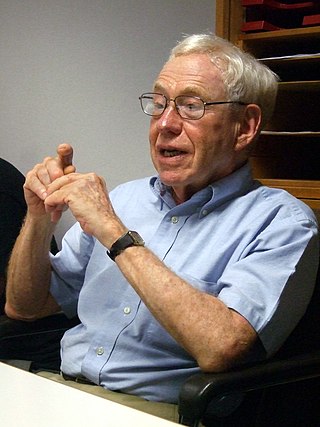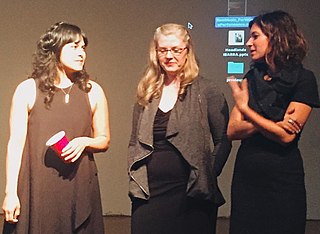Related Research Articles

Cognitive science is the interdisciplinary, scientific study of the mind and its processes with input from linguistics, psychology, neuroscience, philosophy, computer science/artificial intelligence, and anthropology. It examines the nature, the tasks, and the functions of cognition. Cognitive scientists study intelligence and behavior, with a focus on how nervous systems represent, process, and transform information. Mental faculties of concern to cognitive scientists include language, perception, memory, attention, reasoning, and emotion; to understand these faculties, cognitive scientists borrow from fields such as linguistics, psychology, artificial intelligence, philosophy, neuroscience, and anthropology. The typical analysis of cognitive science spans many levels of organization, from learning and decision to logic and planning; from neural circuitry to modular brain organization. One of the fundamental concepts of cognitive science is that "thinking can best be understood in terms of representational structures in the mind and computational procedures that operate on those structures."

The mind is the set of faculties responsible for all mental phenomena. Often the term is also identified with the phenomena themselves. These faculties include thought, imagination, memory, will, and sensation. They are responsible for various mental phenomena, like perception, pain experience, belief, desire, intention, and emotion. Various overlapping classifications of mental phenomena have been proposed. Important distinctions group them according to whether they are sensory, propositional, intentional, conscious, or occurrent. Minds were traditionally understood as substances but it is more common in the contemporary perspective to conceive them as properties or capacities possessed by humans and higher animals. Various competing definitions of the exact nature of the mind or mentality have been proposed. Epistemic definitions focus on the privileged epistemic access the subject has to these states. Consciousness-based approaches give primacy to the conscious mind and allow unconscious mental phenomena as part of the mind only to the extent that they stand in the right relation to the conscious mind. According to intentionality-based approaches, the power to refer to objects and to represent the world is the mark of the mental. For behaviorism, whether an entity has a mind only depends on how it behaves in response to external stimuli while functionalism defines mental states in terms of the causal roles they play. Central questions for the study of mind, like whether other entities besides humans have minds or how the relation between body and mind is to be conceived, are strongly influenced by the choice of one's definition.

In their most common sense, the terms thought and thinking refer to conscious cognitive processes that can happen independently of sensory stimulation. Their most paradigmatic forms are judging, reasoning, concept formation, problem solving, and deliberation. But other mental processes, like considering an idea, memory, or imagination, are also often included. These processes can happen internally independent of the sensory organs, unlike perception. But when understood in the widest sense, any mental event may be understood as a form of thinking, including perception and unconscious mental processes. In a slightly different sense, the term thought refers not to the mental processes themselves but to mental states or systems of ideas brought about by these processes.

Hubert Lederer Dreyfus was an American philosopher and professor of philosophy at the University of California, Berkeley. His main interests included phenomenology, existentialism and the philosophy of both psychology and literature, as well as the philosophical implications of artificial intelligence. He was widely known for his exegesis of Martin Heidegger, which critics labeled "Dreydegger".
Distributed cognition is an approach to cognitive science research that was developed by cognitive anthropologist Edwin Hutchins during the 1990s.
Movements in cognitive science are considered to be post-cognitivist if they are opposed to or move beyond the cognitivist theories posited by Noam Chomsky, Jerry Fodor, David Marr, and others.
Experimental philosophy is an emerging field of philosophical inquiry that makes use of empirical data—often gathered through surveys which probe the intuitions of ordinary people—in order to inform research on philosophical questions. This use of empirical data is widely seen as opposed to a philosophical methodology that relies mainly on a priori justification, sometimes called "armchair" philosophy, by experimental philosophers. Experimental philosophy initially began by focusing on philosophical questions related to intentional action, the putative conflict between free will and determinism, and causal vs. descriptive theories of linguistic reference. However, experimental philosophy has continued to expand to new areas of research.
Computational cognition is the study of the computational basis of learning and inference by mathematical modeling, computer simulation, and behavioral experiments. In psychology, it is an approach which develops computational models based on experimental results. It seeks to understand the basis behind the human method of processing of information. Early on computational cognitive scientists sought to bring back and create a scientific form of Brentano's psychology.

John Richard Perry is Henry Waldgrave Stuart Professor of Philosophy Emeritus at Stanford University and Distinguished Professor of Philosophy Emeritus at the University of California, Riverside. He has made significant contributions to philosophy in the fields of philosophy of language, metaphysics, and philosophy of mind. He is known primarily for his work on situation semantics, reflexivity, indexicality, personal identity, and self-knowledge.

Lera Boroditsky is a cognitive scientist and professor in the fields of language and cognition. She is one of the main contributors to the theory of linguistic relativity. She is a Searle Scholar, a McDonnell Scholar, recipient of a National Science Foundation Career award, and an American Psychological Association Distinguished Scientist. She is Professor of Cognitive Science at the University of California, San Diego. She previously served on the faculty at Massachusetts Institute of Technology and at Stanford.
In philosophy of mind, the computational theory of mind (CTM), also known as computationalism, is a family of views that hold that the human mind is an information processing system and that cognition and consciousness together are a form of computation. Warren McCulloch and Walter Pitts (1943) were the first to suggest that neural activity is computational. They argued that neural computations explain cognition. The theory was proposed in its modern form by Hilary Putnam in 1967, and developed by his PhD student, philosopher, and cognitive scientist Jerry Fodor in the 1960s, 1970s, and 1980s. Despite being vigorously disputed in analytic philosophy in the 1990s due to work by Putnam himself, John Searle, and others, the view is common in modern cognitive psychology and is presumed by many theorists of evolutionary psychology. In the 2000s and 2010s the view has resurfaced in analytic philosophy.

Philosophy of mind is a branch of philosophy that studies the ontology and nature of the mind and its relationship with the body. The mind–body problem is a paradigmatic issue in philosophy of mind, although a number of other issues are addressed, such as the hard problem of consciousness and the nature of particular mental states. Aspects of the mind that are studied include mental events, mental functions, mental properties, consciousness and its neural correlates, the ontology of the mind, the nature of cognition and of thought, and the relationship of the mind to the body.

Embodied cognition is the theory that many features of cognition, whether human or otherwise, are shaped by aspects of an organism's entire body. Sensory and motor systems are seen as fundamentally integrated with cognitive processing. The cognitive features include high-level mental constructs and performance on various cognitive tasks. The bodily aspects involve the motor system, the perceptual system, the bodily interactions with the environment (situatedness), and the assumptions about the world built into the organism's functional structure.

Michael Huemer is a professor of philosophy at the University of Colorado, Boulder. He has defended ethical intuitionism, direct realism, libertarianism, veganism, and philosophical anarchism.
In philosophy of mind, the extended mind thesis (EMT) says that the mind does not exclusively reside in the brain or even the body, but extends into the physical world. The EMT proposes that some objects in the external environment can be part of a cognitive process and in that way function as extensions of the mind itself. Examples of such objects are written calculations, a diary, or a PC; in general, it concerns objects that store information. The EMT considers the mind to encompass every level of cognition, including the physical level.
Stephen Houlgate is a British philosopher and Professor of Philosophy at the University of Warwick. He is known for his works on Hegel, Heidegger and Derrida's thought.
Donald Paul Rutherford is a Canadian philosopher and a professor of philosophy at the University of California, San Diego. He is known for his research on early modern philosophy. Rutherford is a former president of Leibniz Society of North America (2010-14) and a winner of its Essay Prize (1992). He is an editor of Oxford Studies in Early Modern Philosophy.

A Short History of Modern Philosophy: From Descartes to Wittgenstein is a 1982 book by the English philosopher Roger Scruton, in which the author provides a history of modern philosophy. The second revised and enlarged edition was published in 1995. Scruton examines the thoughts of Descartes, Spinoza, Leibniz, Hobbes, Locke, Berkeley, Hume, Kant, Hegel, Schopenhauer, Kierkegaard, Marx, Nietzsche, Mill, Frege, Husserl, Heidegger and Wittgenstein among others.
David Liggins is a philosopher at the University of Manchester with research interests in metaphysics and philosophy of mathematics.
Lambros Malafouris is a Greek-British cognitive archaeologist who has pioneered the application of concepts from the philosophy of mind to the material record. He is Professor of Cognitive and Anthropological Archaeology at the University of Oxford. He is known for Material Engagement Theory, the idea that material objects in the archaeological record are part of the ancient human mind.
References
- ↑ "Prof Michael Wheeler". History of Distributed Cognition.
- ↑ Gallagher, Shaun (2007). "Review of Reconstructing the Cognitive World: The Next Step". Mind. 116 (463): 792–796. doi:10.1093/mind/fzm792. ISSN 0026-4423. JSTOR 30163552.
- ↑ Welchman, Alistair (2 February 2008). "Reconstructing the Cognitive World: The Next Step". Notre Dame Philosophical Reviews.
- ↑ Braver, Lee (1 April 2014). "Heidegger and Cognitive Science, edited by Julian Kiverstein and Michael Wheeler". Mind. 123 (490): 616–619. doi:10.1093/mind/fzu093. ISSN 0026-4423.
- ↑ Wilson, Robert A. (1 October 2006). "Michael Wheeler, "Reconstructing the Cognitive World: The Next Step."". Philosophy in Review. 26 (5): 386–388. ISSN 1920-8936.